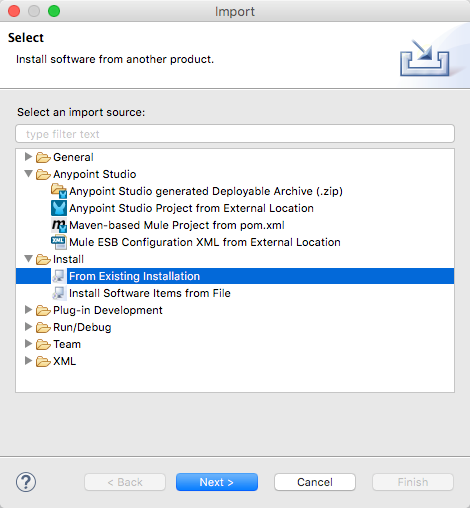Mule runtime engine
Anypoint Studio 6.6 with Mule Runtime Engine 3.9.4 Update Site 5 Release Notes
May 28, 2020
Build ID: 202005271503
What’s New
The Anypoint Studio 6.6.5 release focuses on bug fixes.
See the complete list of solved issues below.
Compatibility
Version: 3.9.4 EE |
|
Anypoint Studio |
Version: 6.6.5 |
APIkit |
Versions: 3.9.4 |
DataWeave |
Version: 1.2.3 |
MUnit |
Version: 1.7.4 (munit-studio-plugin) |
SAP Connector |
Versions: 3.2.5 |
Eclipse |
Versions: 4.7.2 |
Hardware Requirements
-
MuleSoft recommends a minimum of 8GB RAM on a developer workstation. As applications become complex, consider adding more RAM.
-
2GHz CPU
-
10GB free hard drive space
Software Requirements
Java Environments |
This version of Anypoint Studio requires AdoptOpenJDK 8 to run properly. Depending on which Mule runtime engine you want to use, you can configure different JDK versions within Anypoint Studio:
|
Operating Systems |
|
|
Running real-time antivirus protection software on your operating system might have a negative impact on Anypoint Studio performance. Although this issue is prominent on Windows, it also occurs on Linux and macOS. Although the steps to solve these performance issues vary depending on your antivirus software, a typical solution is to either allow or exclude the Anypoint Studio and java executables, the Studio install and workspace filesystem locations, or some combination of both. See examples of solutions for McAfee Viruscan, Windows Defender, and Symantec Endpoint Protection. |
Migration Guide
Updating your Anypoint Studio version using the update site does not update the bundled version of the Mule runtime engine.
To get the latest Mule version after updating Studio, follow these steps.
When opening a previous workspace with projects that were created with Studio 5.1.0 or older, and which has metadata stored in disk, Studio prompts you to update all the projects so that the Metadata Manager can handle the existing types and show them in your project.
|
You can import all of the external components that you had installed in your old version of Anypoint Studio with a single action. These components include connectors, runtimes, and any other type of extension added through the Anypoint Exchange or the Help → Install new software menu, as long as there are no compatibility restrictions. Do this by selecting File > Import and then choose Install > From existing installation. 
Then specify the location of your old version of Anypoint Studio in your local drive. |
Solved Issues
-
Fixed issue that prevented Studio from refreshing the files on your workspace when those files were edited by tools external to Studio.
-
Fixed issue causing git merge conflicts due to the entries in the
mule-deploy.propertiesfile being unsorted. -
Fixed "RAML not found" error when reloading HTTP Connector configuration.
-
Fixed issue preventing Studio from loading a RAML API specification from Exchange and generating flows.
-
Fixed usage of "config-ref" in HTTP transport configuration properties.
-
Fixed issue preventing a Mule runtime engine 3.x application from starting up when deploying it using Mule Plugin for Maven 2.3.3.
-
Fixed issue with path separators on XML flow files when migrating from Studio 6.5.2.
-
Fixed issue that forced Studio to require you to save your changes, even when nothing was modified.
-
Fixed usage of an external DWL file in an MUnit test.
-
Fixed issue preventing the debugger from stopping at a breakpoint when running MUnit tests.
-
Studio now prioritizes Maven proxy settings when publishing to Exchange.
-
When creating an API using auto-discovery, Studio now defaults the
createoption tofalse.
Support
-
Access MuleSoft Forum to pose questions and get help from the broad community of MuleSoft users.



